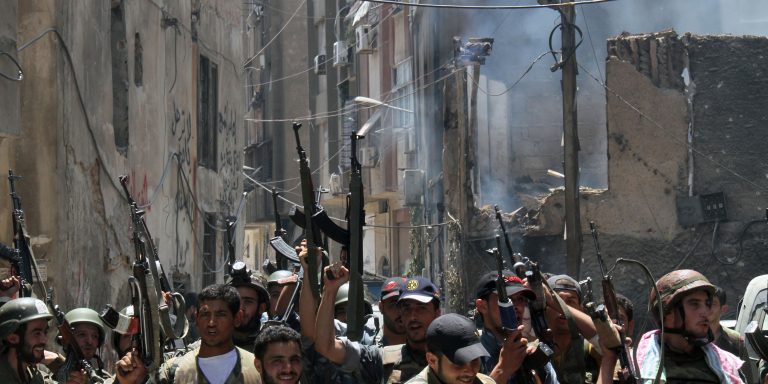INTELBRIEF
July 3, 2018
IntelBrief: The End Of the Southern Syrian Rebels

- Backed by substantial Russian air strikes, the Assad regime has launched an offensive in southern Syria.
- The campaigns against Deraa, Quneitra, and Sweida mean the end of the year-long negotiated ‘de-escalation zones’.
- The new fighting is in a politically sensitive area, bordering the Golan Heights and Jordan.
- The U.S. has openly told rebels in the south not to expect U.S. support, as part of the larger U.S. disengagement from Syria.
.
The seven-year Syrian Civil War has seen numerous shifts in momentum, with the Assad regime at times suffering serious and sustained loses. The latest shift shows no sign of abating, with the combination of substantial Russian air support and the cessation of much of the United States and other support for various rebel groups. The trend line of Assad gains against the rebels is now a trend line towards an inevitable military victory for Assad and his internal and external supporters, with an uncertain future after that.
The Assad regime is now targeting the last rebel strongholds in the south, in the governorates of Deraa, Quneitra, and Sweida. These are rebel strongholds without substantial external support or protection, unlike the rebel groups in the north that the U.S or Turkey support separately (and often contentiously). Without the protection of nearby Turkish or U.S. military personnel, the southern rebels are at the mercy of a Russian air campaign that has shown no mercy, targeting hospitals, aid stations, and schools for years across the country. This week saw the first Russian airstrikes in southern Syria as the campaign began.
The offensive shreds the idea of ‘de-escalation zones’ that the U.S., Russia, and Jordan agreed to help protect during negotiations in 2017. In reality, there are no such zones anymore unless there are foreign troops whose presence will deter an Assad/Russian/Iranian attack. Tens of thousands of civilians are now at great risk from Russian strikes that are setting the stage for regime ground forces that include Iranian personnel as well as various militias. This will put enormous pressure on Jordan, which is barely withstanding the pressures of the last seven years of war and displacement on its northern border. Jordan and Lebanon have announced they are sealing their borders to the influx of desperate refugees expected to flee the onslaught. Both countries have shouldered—along with Turkey—the vast majority of the nearly incomprehensible numbers of refugees. The combination of fatigue and an inability to safely accommodate thousands more refugees on the part of Jordan and Lebanon, and a West that is doing little to alleviate the growing pressures, has created the potential for yet another humanitarian disaster in a war that has seen countless.
Adding to the pressure is that the fighting is near the Golan Heights, where Israeli troops are watching the influx of Iranian military personnel and capability with concern. Israel has stepped up strikes inside Syria against what it says are Iranian targets that threaten Israel, to include weapons shipments and storage facilities, and an air base used by Iran. Israel will not let Iran settle into a sizable presence near the Golan Heights. Assad and his supporters will likely work to maximize Russian air power to force negotiated settlements to minimize an Iranian presence that would bring about a forceful Israeli response. This increases the already terrible toll on Syrian civilians, which in turn creates more pressure on beleaguered humanitarian services, creating another feedback loop of misery.
As concerns grew over a possible Assad regime offensive in the area, the U.S. expressly told the southern rebels not to expect U.S. support, saying ‘We in the United States government understand the difficult conditions you are facing and still advise the Russians and the Syrian regime not to undertake a military measure that violates the zone.’ That violation has now occurred and will likely end with the defeat, negotiated or otherwise, of the southern rebels.
.
For tailored research and analysis, please contact: info@thesoufancenter.org
[video width="960" height="540" mp4="https://thesoufancenter.org/wp-content/uploads/2018/07/IB-0703.mp4" poster="https://thesoufancenter.org/wp-content/uploads/2018/07/AP_961129386186.jpg"][/video]